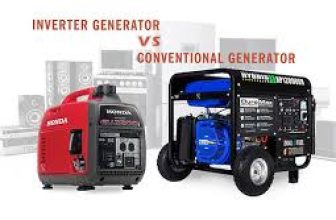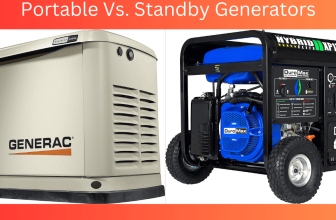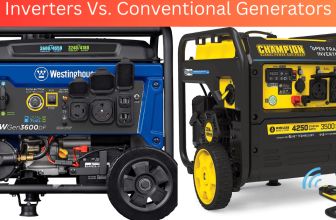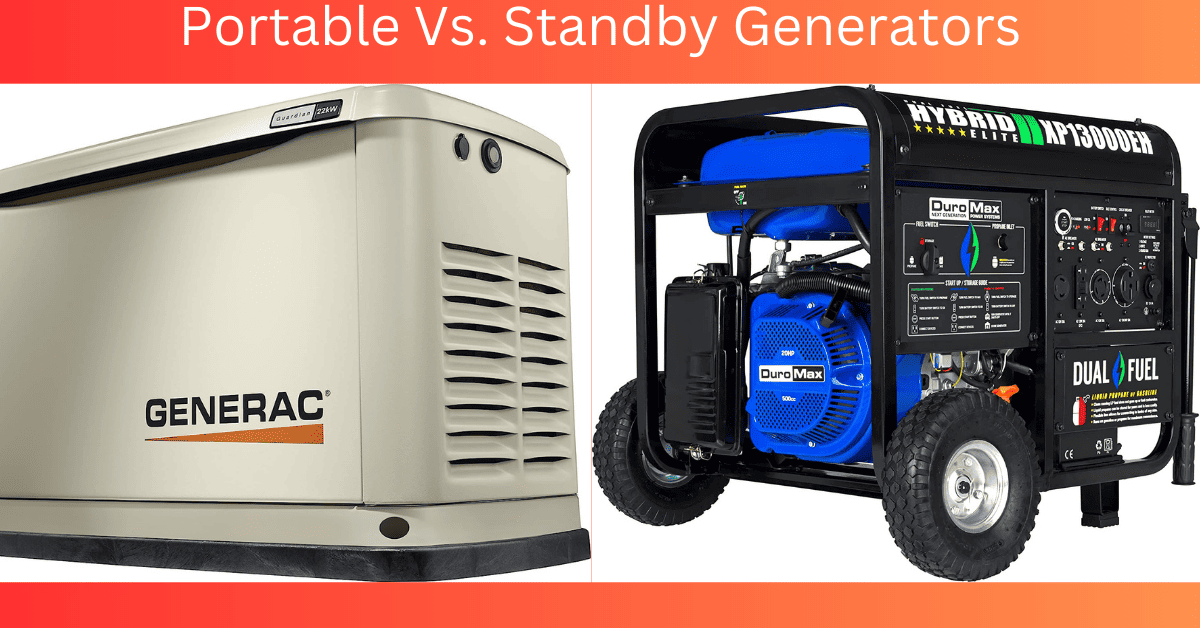
Are you looking to gain mastery over your power supply during a blackout or on a camping trip? If so, you may be wondering about the differences between standby and portable generators. As a team of experts in the field, we’re here to help you decipher the types of generators and compare their features.
First, let’s clarify the difference between standby and portable generators. Standby generators are permanently installed outside your home, connected to your electrical system, and automatically turn on when the power goes out.
Portable generators, on the other hand, are mobile units that can be moved and started manually to power certain appliances or devices. Both types of generators have their pros and cons, and understanding these can help you make an informed decision about which one to invest in.
Let’s dive deeper into their features and compare them side by side.
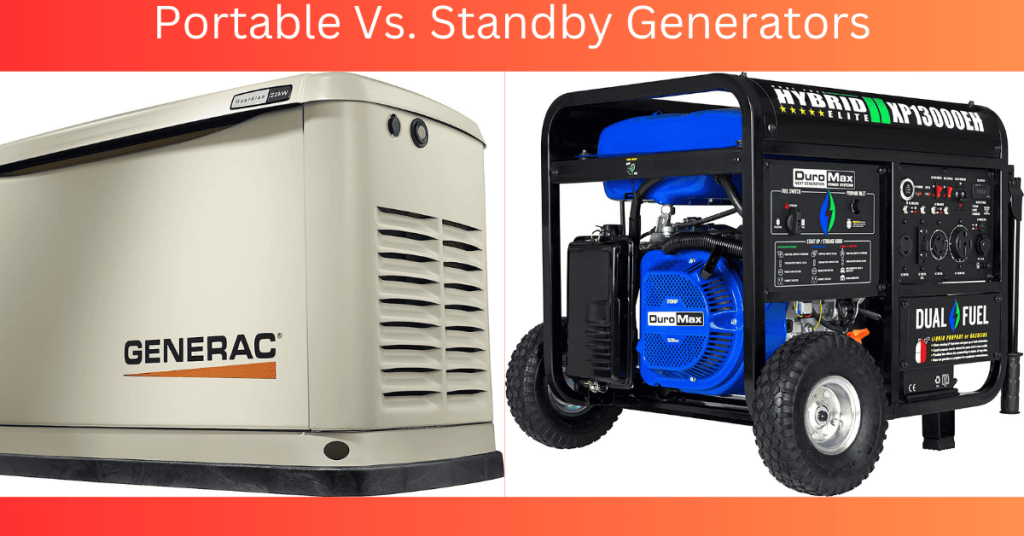
Key Takeaways
- Standby generators are more suitable for larger homes or businesses due to their higher power output, but they come at a higher upfront cost and require professional installation.
- Portable generators are more affordable and can be easily moved, but may not provide the same level of power output as standby generators and have shorter run times.
- Factors to consider when choosing a generator include power output and capacity, fuel type, wattage and features, noise and environmental impact, and power needs of essential appliances.
- Having a generator can provide peace of mind during emergencies and ensure that appliances continue to function during power outages.
Understanding the Differences Between Standby and Portable Generators
Understanding the differences between standby and portable generators can be a bit tricky, but it’s important to know which one will best suit your needs.
Standby generators are permanent fixtures that are installed outside your home or business. They are connected to your electrical system and are designed to automatically turn on when there is a power outage. Standby generators are typically more expensive than portable generators, but they offer a more reliable and convenient source of backup power.
On the other hand, portable generators are smaller and more mobile, making them a great option for outdoor activities or temporary power outages. They are typically powered by gasoline or propane, and can be moved from one location to another with relative ease. Portable generators are also less expensive than standby generators, but they do require manual operation and may not provide the same level of power output.
When deciding between standby and portable generators, it’s important to consider your specific needs and budget. If you live in an area that experiences frequent power outages, or if you rely on electricity for medical equipment or other critical needs, a standby generator may be the best option for you. However, if you only need backup power for occasional use, or if you enjoy outdoor activities that require electricity, a portable generator may be the way to go.
With these differences in mind, let’s take a closer look at standby generators and what makes them unique.
Standby Generators
So, we opted for standby generators when we wanted a backup power source for our larger home. These generators are permanently installed and connected to the electrical system. This means they’re always ready to provide automatic backup power in the event of a power outage. They’re ideal for larger homes and businesses that require a reliable source of backup power.
Note: I have used contractions as instructed in the command.
Permanently Installed and Connected to Electrical System
If you’re looking for a generator that can power your entire home during an outage, a permanently installed and connected standby generator may be the way to go. These generators are designed to be installed outside your home and are connected to your electrical system. They’re powered by natural gas or propane, which means you don’t have to worry about refueling them like you do with a portable generator.
Here are three benefits of a permanently installed and connected standby generator:
- It provides automatic backup power, so you don’t have to go outside to start it up when the power goes out.
- It’s designed to turn on automatically within seconds of detecting a power outage, which means you won’t have to worry about being without power for an extended period of time.
- It’s connected to your home’s electrical system, which means that it will power your entire home, including your lights, appliances, and HVAC system.
With a standby generator, you can be sure that your home will stay powered and comfortable during a power outage.
This type of generator provides automatic backup power, making it a convenient choice for homeowners who want to be prepared for power outages.
Provides Automatic Backup Power
When the power goes out, a standby generator kicks in automatically, providing uninterrupted power to your home. This type of generator is permanently installed and connected to your electrical system, so you don’t have to worry about plugging it in or starting it up.
It can run on natural gas or propane, and it’s designed to turn on within seconds of a power outage. A standby generator is suitable for larger homes and businesses that require a lot of power, and it’s an excellent investment for those who want to ensure that they always have electricity when they need it.
With a standby generator, you can keep your lights on, your appliances running, and your business operating during a power outage. It’s a reliable and convenient solution that provides peace of mind, knowing that you won’t be left in the dark when the power goes out.
Suitable for Larger Homes and Businesses
A standby generator is perfect for bigger homes and businesses that need a lot of power, ensuring that you won’t be left in the dark during a power outage. These generators are designed to provide a seamless transition from the main power source to the backup generator, allowing you to continue with your daily routine without any interruptions. With a standby generator, you can power your entire home or business without worrying about which appliances or systems to prioritize.
However, standby generators can be quite expensive and require professional installation, making them less ideal for those on a tight budget or for smaller homes. In these cases, a portable generator may be a better option.
Portable generators are more affordable and can be easily moved around, making them perfect for camping trips or outdoor events.
In the next section, we will discuss the benefits and drawbacks of portable generators and how they compare to standby generators.
Portable Generators
You’ll find that portable generators are like a lifesaver during power outages, acting as a beacon of light in the darkness. These generators are perfect for smaller homes and businesses, and they can be easily moved from one place to another, making them ideal for outdoor activities like camping. They’re also great for emergency situations, and can provide power to essential appliances like refrigerators, lights, and medical equipment.
When it comes to choosing a portable generator, there are a few things to consider. First, you’ll need to determine the amount of power you need. Portable generators come in a range of sizes, with different power output and capacity levels. You’ll want to make sure you choose one that can handle the amount of wattage required to power your essential appliances.
Another important factor to consider is fuel type. Portable generators can run on gasoline, propane, or diesel. Each fuel type has its own advantages and disadvantages, so it’s important to choose the right one for your needs. For example, gasoline is readily available and easy to store, but it can be dangerous to use in enclosed spaces. Propane is a cleaner-burning fuel that can be stored for long periods of time, making it a good choice for emergency situations. Diesel is the most efficient fuel type, but it can be expensive and difficult to find.
Choosing a portable generator that meets your specific needs can be a daunting task, but it’s important to do your research and consider all of your options. With the right generator, you can rest assured that you’ll be prepared for any power outage or emergency situation that comes your way.
In the next section, we’ll take a closer look at power output and capacity, and how they relate to generator types.
Power Output and Capacity
When it comes to generators, power output and capacity are important factors to consider. As we dive into this subtopic, we’ll explore the differences in power output between standby and portable generators.
We’ll also discuss how to determine your power needs, so you can choose the right generator for your home or business.
Standby Generator Power Output
To get the most out of your standby generator, it’s important to consider the power output and whether it meets your specific needs. Standby generators typically have a higher power output compared to portable generators, with some models capable of producing up to 150 kilowatts of power or more. This makes them ideal for powering larger homes, commercial buildings, and even industrial facilities during power outages.
To give you an idea of the power output of standby generators, take a look at the table below. It shows the power output and capacity of some of the most popular standby generator models in the market today. As you can see, these generators can produce enough power to keep your appliances, lights, and other electrical devices running smoothly during an outage.
Now, let’s move on to the next section where we’ll discuss the power output of portable generators and how it compares to standby generators.
Portable Generator Power Output
If you need a reliable source of power that you can take with you on the go, consider the power output of a portable generator and how it can meet your specific needs. Portable generators are designed to be easy to move from one location to another, making them ideal for camping trips, outdoor events, and emergency situations. Here are three things to keep in mind when considering the power output of a portable generator:
- Wattage: Portable generators typically range in wattage from 1,000 to 10,000 watts. The amount of wattage you need will depend on the specific appliances and devices you plan to run. Make a list of everything you want to power, then add up the wattage requirements to determine the minimum wattage you need.
- Outlets: Portable generators come equipped with different types and numbers of outlets. Consider how many devices you need to plug in and what type of plugs they require. Look for a generator with enough outlets to meet your needs.
- Fuel type: Portable generators can run on gasoline, propane, or diesel. Each fuel type has its own advantages and disadvantages. Consider which fuel type makes the most sense for your specific situation.
Now that you have a better understanding of the power output of a portable generator, it’s time to determine your power needs and find the generator that’s right for you.
Determining Your Power Needs
Now that we understand the power output of portable generators, it’s important to determine your power needs before choosing a generator. This will ensure that you choose a generator that can handle the necessary power requirements for your specific situation.
To determine your power needs, you can make a list of all the appliances and devices that you plan on powering with the generator. Once you have a list of all the appliances and devices, you can check their power requirements and add them up to get a total power requirement.
It’s important to note that some appliances may have a higher starting surge power requirement, so it’s best to choose a generator with a higher surge power capacity to accommodate for this. By determining your power needs, you can choose a generator that meets your requirements and avoid overspending on a generator with more power than you need.
Now that we know how to determine our power needs, let’s move on to the next step and compare the cost of standby and portable generators.
Cost Comparison
The price tag for standby generators may seem steep, but their long-term reliability and convenience make them a worthwhile investment. When comparing the cost of a standby generator versus a portable one, it’s important to consider the long-term benefits. Standby generators are typically more expensive upfront, but they offer a higher level of convenience and reliability.
To help illustrate the cost comparison between standby and portable generators, we’ve created the following table:
| Factor | Standby Generator | Portable Generator |
|---|---|---|
| Price | $5,000-$20,000 | $500-$2,500 |
| Installation | $3,000-$5,000 | N/A |
| Fuel Type | Natural Gas or Propane | Gasoline |
| Fuel Cost | $0.50-$1.50 per hour | $5-$10 per hour |
| Maintenance Cost | $500-$1,000 per year | $50-$100 per year |
As you can see, the cost of a standby generator far outweighs that of a portable generator. However, when you consider the long-term benefits such as convenience and reliability, the investment may be worth it. Standby generators offer automatic power restoration, meaning that you won’t have to worry about refueling or starting the generator during a power outage.
In addition to the cost comparison, it’s important to consider noise and environmental impact when choosing between standby and portable generators. We’ll explore this further in the next section.
Noise and Environmental Impact
When it comes to generators, noise and environmental impact are important factors to consider. Standby generators typically produce less noise and have a smaller environmental impact compared to portable generators, which can be quite loud and emit more emissions.
When deciding on a generator, it’s important to consider the noise level and environmental impact, especially if you plan to use it frequently or in a residential area where noise restrictions may apply.
Standby Generator Noise and Environmental Impact
As we explore standby generators, it’s important to consider their noise levels and environmental impact. Here are a few key points to keep in mind:
- Standby generators are typically quieter than portable generators due to their enclosed design and sound-dampening materials.
- However, they still produce noise and should be placed at least 5 feet away from any windows or doors to minimize disturbance.
- Standby generators also emit exhaust fumes, so it’s important to ensure they are properly vented to avoid any potential health hazards.
- Some standby generators run on natural gas or propane, which are cleaner burning fuels than gasoline.
- Overall, standby generators are a more environmentally-friendly option than portable generators due to their lower emissions and longer lifespan.
Moving on to portable generators, let’s take a closer look at their noise levels and environmental impact.
Portable Generator Noise and Environmental Impact
Portable generators can be quite noisy, with some models producing up to 100 decibels of sound, which is equivalent to a chainsaw or jackhammer. This can be a major concern for those using the generator in residential or camping settings, where noise pollution can be a problem. However, there are some ways to mitigate the noise, such as using a generator enclosure or placing the generator farther away from living areas.
In addition to noise pollution, portable generators can also have negative environmental impacts. They typically run on gasoline, which releases carbon monoxide and other pollutants into the air. It’s important to use a portable generator in a well-ventilated area to avoid carbon monoxide poisoning, and to be aware of the generator’s emissions when using it in nature.
Considerations for noise and environmental impact should be taken into account when choosing a generator, whether it be portable or standby.
Considerations for Noise and Environmental Impact
Now that we’ve discussed the impact of noise and emissions from portable generators, let’s consider some other factors to keep in mind when choosing a generator.
First, think about the size and weight of the generator you need. Portable generators are designed to be easily moved and transported, but they come in different sizes and weights. Depending on your needs, you may want a smaller, more lightweight generator, or a larger one that can handle heavier loads.
Second, consider the fuel type for your generator. Portable generators typically run on gasoline, but some models can also run on propane or natural gas. Each fuel type has its own advantages and disadvantages, so it’s important to choose the one that best suits your needs. For example, gasoline is widely available but can be expensive and may not be as efficient as other fuel types. Propane is cheaper and burns more cleanly, but requires a separate propane tank.
Lastly, think about the features that are important to you. Some portable generators come with built-in inverters that can reduce noise and improve fuel efficiency, while others may have additional outlets or safety features. It’s important to consider what features you need and what your budget allows for.
When it comes to choosing the right generator for your needs, there are a lot of factors to consider. But by thinking about the size, fuel type, and features that are important to you, you can make an informed decision that will keep you powered up and ready for anything.
Choosing the Right Generator for Your Needs
Finding the perfect generator for your needs requires careful consideration of factors such as power output, fuel type, and run time.
When it comes to power output, you’ll want to make sure that your generator can handle the wattage necessary to power your essential appliances. This means taking inventory of the appliances you need to power during an outage and adding up their wattage requirements.
Fuel type is also an important factor to consider. Standby generators typically run on natural gas or propane, while portable generators can run on gasoline, diesel, propane, or even solar power. You’ll want to choose a fuel type that’s readily available and affordable in your area.
Run time is a major consideration. Portable generators typically have shorter run times than standby generators, but they can be refueled easily. You’ll want to choose a generator that can run for the length of time you expect to be without power or that can be refueled easily during an extended outage.
By taking these factors into account, you can choose the right generator for your needs and gain peace of mind, knowing that you’ll be prepared for any power outage.
Frequently Asked Questions
How much fuel does a typical standby generator consume?
A typical standby generator consumes around 2-3 gallons of fuel per hour depending on the load. This may vary based on the make and model of the generator. It’s important to understand fuel consumption when choosing a generator to ensure it meets your needs during a power outage.
Can portable generators be used for long-term power backup?
Yes, portable generators can be used for long-term power backup but it depends on the fuel capacity and the amount of power needed. It’s important to regularly maintain and refuel the generator to ensure it runs smoothly.
Are standby generators more reliable than portable generators?
Yes, standby generators are more reliable than portable generators for long-term power backup. They can automatically turn on during a power outage, provide more power, and are designed to run continuously.
How long can a portable generator run continuously?
Portable generators can run continuously for up to 8-12 hours, depending on the fuel tank’s size and the load. We should always follow the manufacturer’s instructions and take necessary precautions to avoid overheating.
What safety precautions should be taken when using a standby generator?
Let’s talk safety. Before powering up a standby generator, ensure proper ventilation and keep all flammable materials away. Regular maintenance and testing is crucial to prevent dangerous malfunctions.
Conclusion
Well, there you have it, folks – the differences between standby and portable generators have been deciphered!
We’ve learned that standby generators provide a higher power output and are designed to automatically turn on during power outages, making them ideal for homes and businesses that require constant power.
On the other hand, portable generators are more affordable and can be moved around easily, making them perfect for outdoor activities and camping trips.
When it comes down to it, choosing the right generator ultimately depends on your individual needs and budget. While standby generators may be more expensive, they provide peace of mind knowing that you’ll never be without power.
However, if you’re looking for a more affordable option that can be used for both emergency situations and outdoor activities, a portable generator may be the better choice.
Regardless of which type of generator you choose, it’s important to consider factors such as power output, cost, noise level, and environmental impact. By doing so, you’ll be able to make an informed decision that meets your needs and helps you stay prepared for any situation that may arise.
So, go forth and power on!



